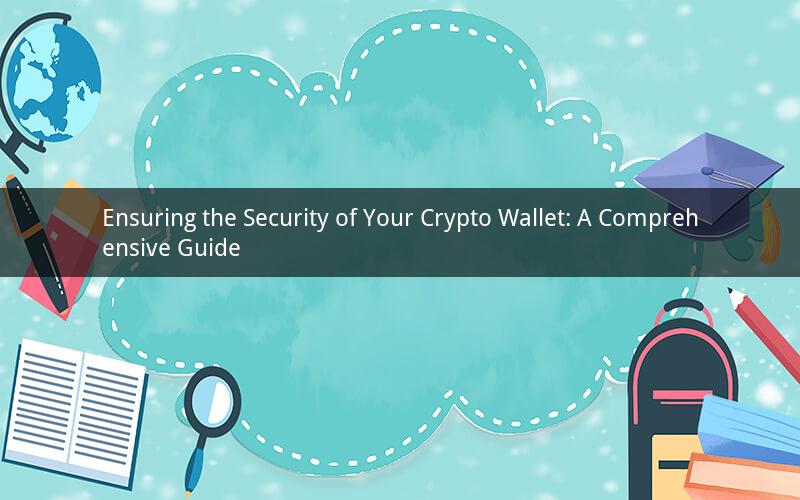
Introduction:
In the rapidly evolving world of cryptocurrencies, the safety of your digital assets is paramount. A crypto wallet serves as the gateway to your digital wealth, making it crucial to protect it from potential threats. This article delves into the best practices and essential steps to keep your crypto wallet safe and secure.
1. Choose a Secure Wallet Type:
The first step in securing your crypto wallet is selecting the right type. There are primarily three types of wallets: hardware wallets, software wallets, and mobile wallets. Each has its own set of advantages and disadvantages, so it's essential to choose one that suits your needs.
Hardware wallets, such as Ledger and Trezor, are considered the most secure option. They store your private keys offline, reducing the risk of hacking. Software wallets, like Exodus and MetaMask, are more convenient for day-to-day transactions but require additional security measures. Mobile wallets, like Trust Wallet and Atomic Wallet, offer convenience but are more susceptible to malware attacks.
2. Use Strong Passwords and PINs:
Your wallet's password and PIN are the first lines of defense against unauthorized access. Create a strong, unique password that combines uppercase and lowercase letters, numbers, and special characters. Avoid using easily guessable information like birthdays or common words. Additionally, enable two-factor authentication (2FA) for an extra layer of security.
3. Keep Your Wallet Software Updated:
Regularly updating your wallet software is crucial to ensure that you have the latest security patches and features. Outdated software can leave your wallet vulnerable to known vulnerabilities and exploits. Enable automatic updates or manually check for updates to stay protected.
4. Be Wary of Phishing Attacks:
Phishing attacks are a common method used by cybercriminals to steal private keys and access your wallet. Be cautious of emails, messages, or calls that request your private keys or personal information. Always verify the legitimacy of the source before providing any sensitive data.
5. Use a Secure Internet Connection:
When accessing your crypto wallet, ensure that you are connected to a secure and trusted network. Avoid using public Wi-Fi networks, as they can be easily intercepted by hackers. Use a VPN to encrypt your internet connection and protect your data from prying eyes.
6. Backup Your Wallet:
Regularly backing up your wallet is essential to prevent data loss and facilitate recovery in case of hardware failure or loss. Follow the wallet provider's instructions to create a backup of your wallet's private keys or mnemonic phrase. Store the backup in a safe and secure location, such as a physical storage device or a secure cloud service.
7. Be Mindful of Scams and Fake Wallets:
The crypto ecosystem is rife with scams and fraudulent wallet providers. Conduct thorough research before downloading or using any wallet. Look for reputable reviews, ratings, and a strong track record of security and reliability. Avoid downloading wallets from untrusted sources or clicking on suspicious links.
8. Educate Yourself on Best Practices:
Stay informed about the latest security threats and best practices in crypto wallet security. Follow reputable sources, attend webinars, and join online communities to stay up-to-date with the latest developments. Educating yourself will help you make informed decisions and avoid common pitfalls.
9. Utilize Cold Storage for Large Amounts:
If you hold a significant amount of cryptocurrencies, consider using cold storage solutions, such as paper wallets or hardware wallets, to keep your assets secure. Cold storage involves storing your private keys offline, reducing the risk of online attacks. However, be cautious when handling physical copies of your private keys, as they can be easily damaged or lost.
10. Stay Vigilant and Report Suspicious Activity:
Maintain a vigilant eye on your wallet and monitor your transactions regularly. If you notice any unauthorized activity or suspicious transactions, report them to the wallet provider and relevant authorities immediately. Prompt action can help mitigate potential losses and prevent further harm.
Conclusion:
Keeping your crypto wallet safe is crucial in the cryptocurrency landscape. By following these best practices and staying informed about security measures, you can protect your digital assets from potential threats. Remember, the responsibility for your wallet's security lies with you, so take the necessary precautions to safeguard your crypto wealth.
Questions and Answers:
1. Q: Can I use the same password for my crypto wallet and other online accounts?
A: No, it is crucial to use a unique password for your crypto wallet to prevent potential attacks on multiple accounts. Create strong, unique passwords for each account to enhance your overall security.
2. Q: Is it safe to use a mobile wallet for large amounts of cryptocurrencies?
A: While mobile wallets offer convenience, they are generally less secure than hardware wallets. It is advisable to use mobile wallets for smaller amounts and store larger sums in hardware wallets or cold storage solutions.
3. Q: Can I recover my crypto wallet if I lose my private keys or mnemonic phrase?
A: Yes, you can recover your crypto wallet by using the mnemonic phrase or private keys. However, it is crucial to keep these backups secure and accessible in case of emergencies.
4. Q: Are there any legal implications if my crypto wallet is hacked?
A: The legal implications of a hacked crypto wallet depend on the jurisdiction and the nature of the hack. It is essential to report the incident to the relevant authorities and take necessary steps to mitigate potential losses.
5. Q: Can I use a VPN to protect my crypto wallet while using public Wi-Fi?
A: Yes, using a VPN can help protect your crypto wallet when connected to public Wi-Fi networks. It encrypts your internet connection, preventing hackers from intercepting your data and accessing your wallet.